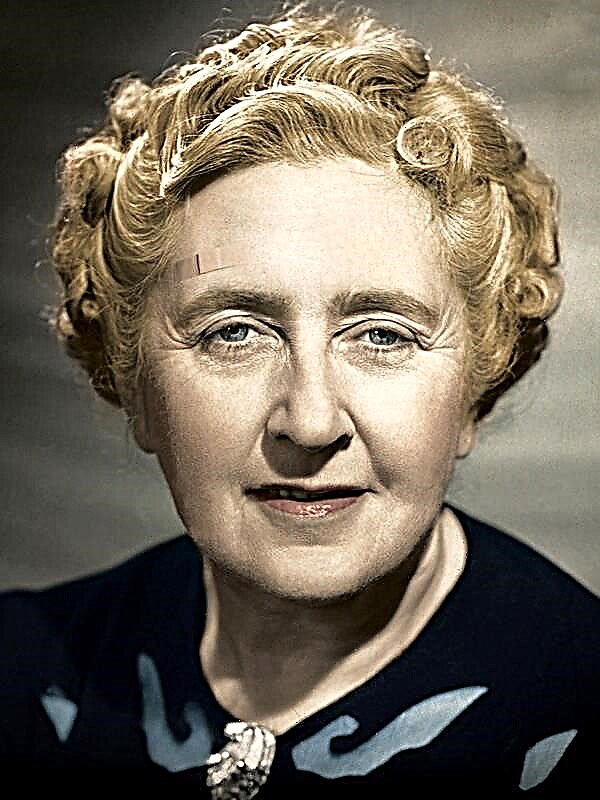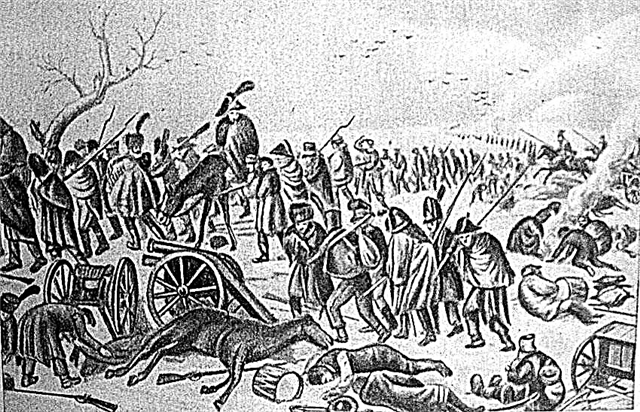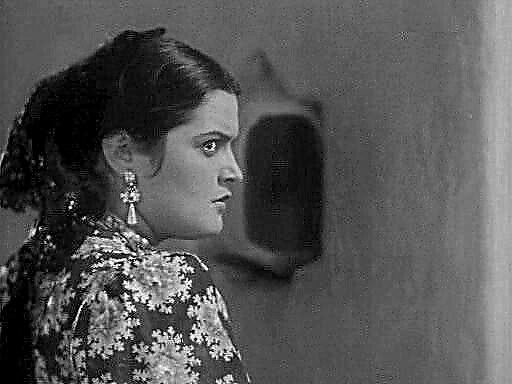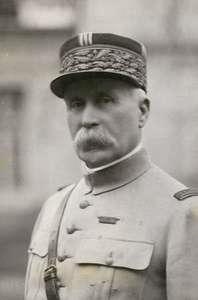The action takes place in Aulis, in the camp of Agamemnon. The yearning king wakes up a faithful servant of Arkas. He is extremely surprised by the dejected look of his master: good luck favors the descendant of the gods Agamemnon - it is not without reason that the fearless warrior Achilles, the most important of the Greek heroes, wants to marry his daughter. Iphigenia will soon arrive with her mother in Aulida, where the marriage ceremony is to be performed. The king is crying, and Arkas fearfully asks if any misfortune has happened to his children or his wife. Agamemnon in response exclaims that he will not allow the death of his daughter. alas, he made a terrible mistake, but is determined to fix it. When an unprecedented calm shackled the Greek ships in the harbor, the brothers of Atrida turned to the priest Kalkhas, and he proclaimed the will of the gods: the Greeks should sacrifice a young virgin, in whose veins the blood of Helen flows - the path to Troy will be closed until Iphigenia ascends to the altar of Diana . Shocked Agamemnon was ready to fight the insidious fate and abandon the campaign, but the cunning uliss managed to convince him. Pride and vanity overpowered parental pity: the king agreed to a terrible sacrifice and, in order to lure Iphigenia with Clytemnestra to Aulida, resorted to deceit - wrote a letter on behalf of Achilles, who at that time went on a campaign against the enemies of his father. The hero has already returned, but the king is not afraid of his anger, but the fact that Iphigenia in happy ignorance flies towards her love - to her death. Only a devoted Arkas can prevent trouble: you need to intercept the women on the road and tell them that Achilles wants to postpone the wedding and that Erifil is to blame for this - the captive taken out from Lesbos. No one should know the true background, otherwise the Achaeans will rebel against the cowardly king, and Clytemnestra will never forgive the intention to give the daughter to slaughter.
The tent of Agamemnon are Achilles and Ulysses. The young hero, unaware of the trick with the letter, longs to go down the aisle with his beloved - in addition, he is impatient to punish the arrogant Ilion. Agamemnon reminds him of the imminent death under the walls of Troy, but Achilles does not want to listen to anything: the parks announced to Mother Fetida that either a long life in obscurity or early death and eternal glory awaits her son - he chooses the second lot. uliss listens with satisfaction to these fervent speeches: in vain Agamemnon was afraid that Achilles would prevent the sacrifice, without which the long-awaited campaign would not take place. Guessing the king’s confusion, Ulysses rebukes him for apostasy: at one time it was Agamemnon who made Elena's suitors swear that they would become her faithful defenders - the Achaeans left their beloved wives and children for the sake of Menelaus's scolded honor. The king angrily replies that it is easy to talk about the greatness of the soul when someone else’s blood is being poured - it is unlikely that Ulysses would have shown such unwaveringness in relation to his own son Telemak. Nevertheless, the word will be kept if Iphigenia arrives in Aulis. Perhaps the gods do not want her death: she could linger on the road or her mother ordered her to stay in Argos. The tsar cuts short in the middle, seeing his servant Euribat Thoth reports that the queen has arrived, although the wedding train has strayed from the road and strayed for a long time in the dark forest. A young captive, Erifilos, is traveling with Clytemnestra and Iphigenia, who wants to ask the priest Kalkhas about her fate. The Greek army rejoices, saluting the family of the beloved king. Agamemnon is terrified - now the daughter is doomed. Ulysses, having guessed the trick of the king, is trying to console him: such is the will of the gods, and mortals cannot be murmured against them. But a brilliant victory awaits ahead: Elena will be returned to Menelaus, and Troy is cast to dust - all thanks to the courage of Agamemnon!
The captive of Erifil reveals the soul to the confidant of Dorin. Fate pursues her from infancy: she does not know her parents, and it was predicted that the secret of birth will be revealed to her only at the death hour. But the most difficult test awaits her ahead - this is the wedding of Iphigenia and Achilles. Erifila admits to the amazed Dorin that she fell in love with a hero who robbed her of her freedom and girlish honor - this bloody villain conquered her heart, and only for him did she go to Aulida. Seeing Agamemnon with his daughter, Erifila steps aside. Iphigenia fondles his father, trying to understand the reason for his apparent embarrassment and coldness. The king is in a hurry to leave, and Iphigenia shares her worries with Erifila: his father is sad, and the groom does not show his eyes - maybe now he only thinks of war. A furious Clytemnestra enters with a letter in his hand. Achilles’s intentions have changed: he offers to postpone the wedding - such behavior is unworthy of a hero. The Tsar’s daughter should not have expected mercy from him, therefore both of them should immediately leave the camp. Erifilah cannot hide her joy, and Iphigenia suddenly realizes why the captive was so eager for Aulida - the reason for this was not Kalkhas at all, but love for Achilles. Now everything became clear - and the dejected look of his father, and the absence of the groom. At that moment, Achilles himself appears, and Iphigenia proudly announces to him his immediate departure. The amazed Achilles turns to Erifil for clarification: he was in such a hurry to see the bride, although Agamemnon insisted that his daughter would not come - why did Iphigenia avoid him and what did Ulysses' hazy speech mean? If someone decided to play a trick on him, he will reward the offender in full. Erifilah is struck in the heart: Achilles loves Iphigenia! But all is not lost yet: the tsar is clearly afraid for his daughter, the princess is being tricked by something, they are hiding something from Achilles - it may still be possible to enjoy vengeance.
Clytemnestra pours out his grievances to Agamemnon: he and his daughter were ready to leave, but then Achilles appeared alarmed and begged them to stay - he vowed to take revenge on the despicable slanderers who accused him of betraying Iphigenia. Agamemnon readily admits that he in vain confided in a false rumor. He personally will take his daughter to the altar, but the queen should not appear in the camp, where everyone breathes with a foreboding of bloodshed. Clytemnestra is stunned - only the mother should pass the daughter into the hands of the groom. Agamemnon is unshakable: if the queen does not want to heed the request, let her obey the order. As soon as the king leaves, happy Achilles and Iphigenia appear. The princess asks the groom to grant freedom to Erifil at this joyful hour for both of them, and Achilles readily promises.
Faithful Arkas is entrusted with taking Iphigenia to the altar. The servant gave the vow to remain silent, but does not stand up and reports on what fate the princess is destined for. Clytemnestra falls at the feet of Achilles, begging to save her daughter. The hero, shocked by the humiliation of the queen, swears to impress anyone who dares to raise a hand against Iphigenia - the tsar will have to answer for his deception. Iphigenia begs the groom to humble her anger: she will never condemn her beloved father and submit to his will in everything - of course, he would save her if it were in his power. Achilles cannot hide her resentment: is her father, who dooms her to death, dearer to her than the one who defended her? Iphigenia meekly objects that her beloved is more precious than life: she unabashedly met the news of imminent death, but she almost lost her senses when she heard a false rumor about his betrayal. Probably, with her immense love for him, she angered the heavens. Erifila, left alone with Dorina, is bubbling with rage. How scared for Iphigenia the fearless Achilles! She will never forgive her rival, and all means are good: Agamemnon, apparently, has not lost hope of saving her daughter and wants to disobey the gods - this blasphemous plan needs to be notified to the Greeks. Thus, she will not only avenge her scolded love, but also save Troy - Achilles will never again stand under the banner of the king. Clytemnestra sarcastically greets her husband - now she knows what fate he has prepared for his daughter. Agamemnon realizes that Arkas did not keep his word. Iphigenia gently consoles her father: she will not shame her kind and without fear she will place her breast under the sacrificial blade - she is scared only for her beloved ones, for her mother and groom, who do not want to come to terms with such a victim. Clytemnestra announces that she will not give up her daughter and will fight for her, like a lioness for her child. If Menelaus wants to hug an unfaithful wife, let him pay with his own blood: he also has a daughter, Hermione. Mother takes Iphigenia away, and Achilles bursts into the royal tent. He demands an explanation: a strange, shameful rumor came to his ears - as if Agamemnon had decided to kill his own daughter. The king arrogantly replies that he is not obliged to report to Achilles and is free to control the fate of his daughter. Achilles can blame himself for this sacrifice - wasn’t he the one most eager for the walls of Troy? The young hero exclaims in a rage that he does not want to hear about Troy, which did not do him any harm - he made a vow of loyalty to Iphigenia, and not Menelu at all! Annoyed, Agamemnon is ready to doom his daughter to the slaughter - otherwise people might think that he was afraid of Achilles. However, pity prevails over vanity: the king orders his wife and daughter to leave Aulida in the strictest secrecy. Erifila hesitates for a moment, but jealousy turns out to be stronger, and the captive decides to tell Kalkhas everything.
Iphigenia is back in the Greek camp. All escape routes are closed. Her father forbade her to even think about the groom, but she dreams of seeing him for the last time. Achilles is full of determination: he orders the bride to follow him - from now on, she must obey her husband, not her father. Iphigenia refuses: death scares her less than dishonor. She swears to impress herself with her own hand - the royal daughter will not dutifully wait for the blow. Clytemnestra, distraught from grief, curses Erifil who betrayed them - night itself did not spew out a more terrible monster! Iphigenia is taken away, and soon Clytemnestra hears thunder peals - this is Kalkhas shedding the blood of the gods on the altar! Arkas resorts with the news that Achilles broke through to the altar with his people and put up a guard around Iphigenia - now the priest cannot approach her. Agamemnon, unable to watch the death of his daughter, covered his face with a cloak. At any moment, a fratricidal massacre may begin.
Uliss enters, and Clytemnestra cries out in horror - Iphigenia is dead! uliss replies that blood was shed on the altar, but her daughter is alive. When the whole Greek army was ready to rush to Achilles, the priest Calchas suddenly announced a new sign: this time the gods accurately indicated the sacrifice - that Iphigenia, who was born of Elena from Theseus. Realizing her terrible fate, the girl arrived in Aulis under a strange name - like a slave and captive of Achilles. Then the soldiers lowered their swords: although many felt sorry for Princess Erifil, everyone agreed with the verdict. But Kalkhas failed to hit Elena's daughter: throwing a contemptuous look at him, she herself pierced her chest with a sword. Immediately, the immortal Diana appeared on the altar - a clear sign that the prayers of the Achaeans reached heaven. After hearing this story, Clytemnestra gives a warm thanks to Achilles.












